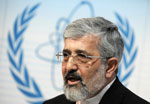 Reuters: Iran would only consider halting higher-grade nuclear enrichment if it first received fuel for a medical reactor from major powers, a senior official said on Friday, a condition unlikely to be accepted by the West.
Reuters: Iran would only consider halting higher-grade nuclear enrichment if it first received fuel for a medical reactor from major powers, a senior official said on Friday, a condition unlikely to be accepted by the West.
By Fredrik Dahl and Sylvia Westall
 VIENNA, June 11 (Reuters) – Iran would only consider halting higher-grade nuclear enrichment if it first received fuel for a medical reactor from major powers, a senior official said on Friday, a condition unlikely to be accepted by the West.
VIENNA, June 11 (Reuters) – Iran would only consider halting higher-grade nuclear enrichment if it first received fuel for a medical reactor from major powers, a senior official said on Friday, a condition unlikely to be accepted by the West.
The comments by Ali Asghar Soltanieh, Iran’s envoy to the U.N. nuclear watchdog, underlined the Islamic Republic’s defiance in the face of increased international pressure over a nuclear programme the West fears is aimed at making bombs.
“We will not, even for a second, suspend our nuclear enrichment activities,” he told Reuters.
Asked if this also included 20 percent enrichment that Iran launched four months ago, a move that drew Western condemnation, he said: “Yes, of course.”
The United Nations Security Council adopted a fourth round of sanctions on Wednesday to punish Iran for its refusal to stop enriching uranium, a process which can yield fuel for nuclear power plants and material for weapons if refined much further.
Western powers are particularly concerned about Iran’s decision in February to start enriching to a level of 20 percent purity from 3.5 percent previously, bringing it closer to the 90 percent level needed for a bomb.
Iran denies any military ambitions, saying its programme is for peaceful purposes, including power generation so that it can export more of its oil and gas.
It escalated its enrichment work after failure to agree terms last year for a swap deal with the United States, Russia and France, under which Iran would send some of its low-enriched uranium (LEU) abroad and receive higher-grade fuel in return.
“HUMANITARIAN WORK”
The plan had been seen as a way to ease nuclear tensions by removing an amount of LEU that could have been used for an atomic bomb, if enriched to high levels.
Turkey and Brazil last month resurrected parts of the proposal, in the hope this would remove the need for sanctions.
But the United States, France and Russia voiced deep doubts about the revised offer shortly before this week’s U.N. sanctions vote, saying in a joint response that it did not address core concerns about Iran’s nuclear programme.
The three powers said Iran must stop the higher-grade enrichment and remove the uranium refined to the 20 percent level which it has produced since then.
Soltanieh accused them of wasting time and of lacking “political will to help this humanitarian work,” referring to the Tehran reactor’s production of isotopes for the treatment of hundreds of thousands of cancer patients.
“By now the fuel should be in the core of the reactor,” Soltanieh said, adding that Tehran was studying the response from big powers.
“When the fuel is not in the core of the reactor and … there is no legally binding guarantee that we will get the fuel, I’m sure that if you were us you would do whatever we are doing, to continue the enrichment of 20 percent,” Soltanieh said.
Asked if this meant that Iran would only consider stopping such work once it has received the fuel, he said: “Then it would be the suitable time to think about it.”


